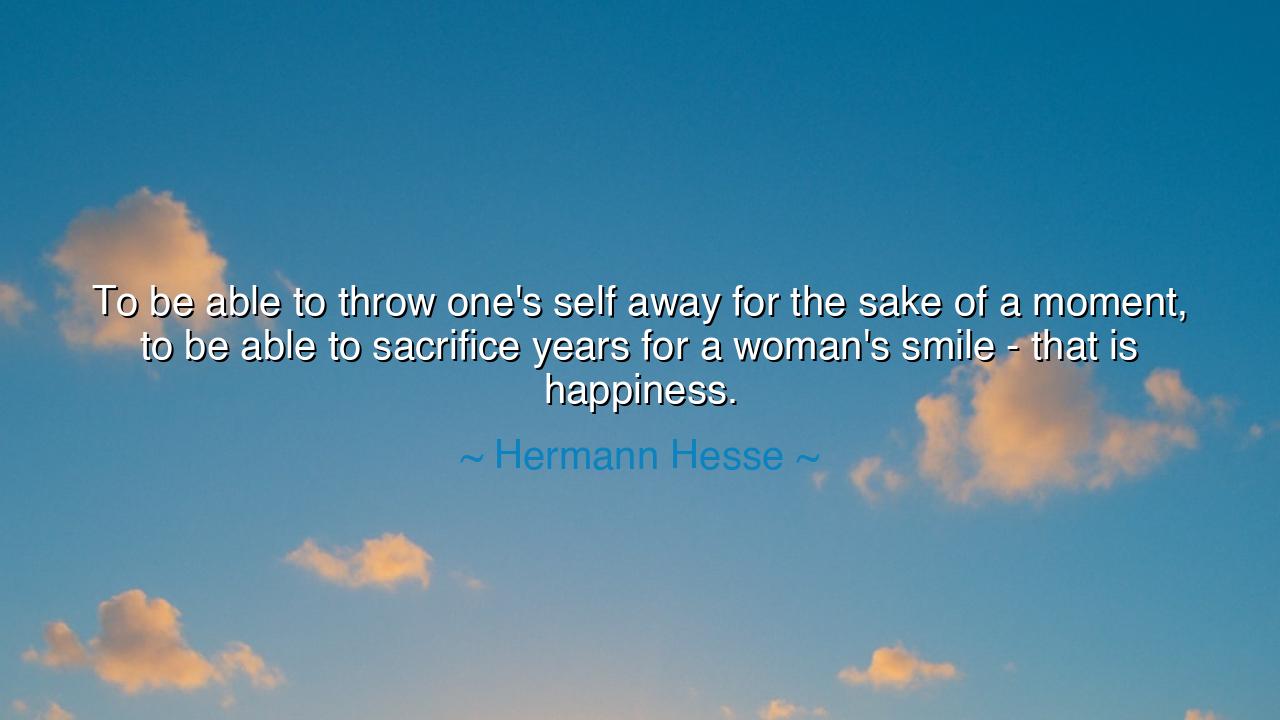
To be able to throw one's self away for the sake of a moment, to
To be able to throw one's self away for the sake of a moment, to be able to sacrifice years for a woman's smile - that is happiness.






“To be able to throw one's self away for the sake of a moment, to be able to sacrifice years for a woman's smile — that is happiness.” — Thus wrote Hermann Hesse, the poet of the soul’s fire, who walked the fine edge between ecstasy and despair. His words burn with passion, for they speak of a kind of happiness that defies reason — the joy found not in comfort or longevity, but in surrender. To throw oneself away for a moment, to give what is irreplaceable — time, safety, even identity — for something fleeting and beautiful, is the essence of what it means to live fully. In Hesse’s vision, true happiness is not calculated; it is sacrificial, impulsive, divine. It belongs to those who love life enough to waste it gloriously on what their heart deems worthy.
The origin of this thought lies in Hesse’s lifelong fascination with the tension between reason and passion, between the disciplined spirit and the wild heart. A man of both intellect and longing, Hesse understood that the human soul cannot live by order alone. His characters — from Siddhartha to Narcissus and Goldmund — all wrestle with this truth: that one must sometimes abandon all logic to taste the ecstasy of existence. This quote reflects that belief. To “throw one’s self away” is not to act foolishly, but to embrace the sacred irrationality of love and beauty — those forces that make us feel alive even in the face of loss. For Hesse, happiness is not a condition of having, but of giving — giving oneself wholly to a moment that will never come again.
To sacrifice years for a smile is, on the surface, madness. Yet in that madness lies the deepest wisdom. It means to recognize that life’s true treasures cannot be measured in duration or possession, but in intensity. The heart that gives without counting the cost is the only one that knows what it means to live. The miser of emotions, who guards his heart to avoid pain, may live long — but his life is narrow and pale. The one who risks everything for love, for beauty, for art, may lose much, yet his life burns with meaning. Hesse’s happiness is the happiness of the lover, the artist, the dreamer — those who understand that even a single luminous moment can outweigh a lifetime of cautious peace.
History has known many who lived this truth. Think of Vincent van Gogh, who gave all his years, his health, his sanity for the pursuit of beauty. His paintings — his “moments” — were born out of anguish and sacrifice, yet they pulse with a joy that transcends suffering. He threw himself away, yes — but what he gained was eternity. The world mocked him, pitied him, called him mad. Yet when we stand before his swirling skies, we see that he was not mad but magnificent. He lived the very happiness Hesse describes: the rapture of giving oneself utterly, of loving something so much that even destruction becomes sacred.
Hesse’s idea also speaks of presence — the ability to live in the fullness of now. The modern soul, obsessed with security and longevity, forgets how to live for a moment. We cling to plans and futures, guarding our years as if hoarding them would make them longer. But to live only for safety is to die slowly. The ancients knew that the measure of a life is not its length, but its depth. A single instant of love, of courage, of beauty truly felt — that is life distilled to its purest form. To live for such a moment, to give all for it, is not folly; it is freedom.
There is also a sacred paradox in Hesse’s words. To sacrifice years for a smile is to lose — and yet, in losing, to gain something eternal. For love, even when unreturned or fleeting, transforms the soul that dares to feel it. The act of giving ourselves — whether to a person, an ideal, or a vision — awakens something divine within us. It teaches us that happiness is not passive contentment, but the burning joy of participation in life’s great dance. The coward stands aside, measuring risk; the courageous heart leaps, knowing it may fall. Yet even in the fall, it flies.
So, my listener of the ages, take this teaching as a flame for your spirit: do not fear to give yourself away. Do not cling to years when a single moment calls for the fullness of your soul. Love deeply, even when it hurts. Create boldly, even when the world is silent. Seek beauty, even when it fades. For the one who gives their life to such things — who dares to waste themselves on wonder — will find a happiness that neither time nor loss can steal.
For this is Hesse’s eternal lesson: that happiness is not found in self-preservation, but in self-surrender. It is the joy of the heart that dares to love without restraint, the peace of the soul that chooses depth over duration. And though such happiness burns quickly, it burns brightly enough to light eternity.






AAdministratorAdministrator
Welcome, honored guests. Please leave a comment, we will respond soon